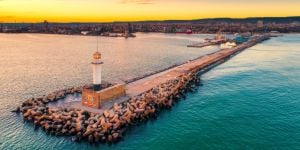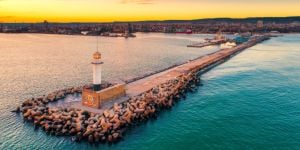Couldn't copy the link but here's the article for anybody needing the details.
As Bulgaria has been a member state of European Union since January 2007, there are various forms of documentation required for foreign nationals who wish to make a permanent move to this country.
Before moving to the country permanently, expats should consider visiting Bulgaria for a short period to get to know it first, search for a suitable property, and check out the terms and conditions of living there in general. These short visits, which vary between 30 and 90 days depending on the expat's home country, require a valid passport but no visa for citizens of the following countries:
Up to 30 days:
Andorra, Australia, Canada, Estonia, Ireland, Israel, Japan, Liechtenstein, Monaco, New Zealand, Switzerland, UK, USA and Vatican.
Up to 90 days:
Austria, Belgium, Chile, Cyprus, Denmark, Finland, France, Germany, Greece, Iceland, Italy, Latvia, Luxembourg, Netherlands, Norway, Portugal, Spain and Sweden.
To move permanently to Bulgaria, expats need a D long-stay visa type, for which they must apply through the Bulgarian embassy or consulate in their home country.
- For US citizens, the visa is free of charge, though there is a $25 processing fee.
- For UK citizens, the visa costs £44, comprising a GBP 30 visa charge and GBP 14 admin fee which is not refundable.
It is wise to contact the appropriate Bulgarian embassy for the application forms or download them from the official website. For the type D visa, expats need:
- Two completed application forms for a Short Entry Visa
- Two recent photos
- Originals of documents giving the reasons for your application
- Proof of your means of financial support (savings / employment contract, etc.)
- Proof that you have arranged suitable accommodation.
The type D visa is for single entry only and it is valid for up to 6 months. It is issued to people who intend to apply for a long-term or permanent residence permit in Bulgaria. Once expats have the D visa, they should be aware that they cannot leave Bulgaria for 3 months. When people get the D-type visa and go to Bulgaria they need to apply for an ID card in the regional directorate, a police station, and wait for it for about 3 months. After they have the ID card they will be able to leave the country and come back again without a visa. The ID card is renewable on a 6 or 12 month basis.
Those who are married to a Bulgarian citizen and are applying for either the short-term or long-term residence / work permit on the basis of being married do not need to apply for a D-visa. They should apply at the appropriate immigration office, which is located in 48 Maria Louisa Blvd. in Sofia. It is important to know that the D-visa is only for residence based on work.
Adequate medical insurance is a condition of visa approval and foreigners cannot enter Bulgaria without it. When they arrive, expats must have insurance to cover emergency medical expenses, repatriation, transporting mortal remains, funeral and hospitalisation, amounting to at least $5000 and valid for the duration of your planned stay. Those who have this already should submit a copy of the policy with their visa application. If contacted by the embassy to hear that their visa is granted, expats should then organize medical cover and submit a copy of the policy or letter from the insurer so that the visa can be issued.
Residence Permits
Having entered Bulgaria on a Long-Stay visa, expats must then contact the Ministry of Internal Affairs to apply for a long-term or a permanent residence permit.
Providing they have the means to support themselves, have made social security payments and have accommodation and medical insurance arranged, a permit for up to one year may be granted if expats meet the following terms:
- Have a work permit to take up full-time employment
- Have a business in Bulgaria with vacancies for at least 10 Bulgarian citizens
- Are starting a full-time course at a Bulgarian educational institution
- Are married to a Bulgarian citizen or to a foreigner who is a permanent resident
- Are the financially secure parents of foreign permanent residents
- Have been admitted for long-term hospital treatment in Bulgaria, with the means to pay for treatment and support themselves
- Are retired, with sufficient means to support themselves
- Have a permit from the Ministry of Labour to be self-employed in Bulgaria
Residence permits for an indefinite length of time may be issued if expats meet these conditions:
- Have lived in Bulgaria permanently for 2 years, after marrying a Bulgarian
- Have lived there legally for 5 years
- Are of Bulgarian ethnic origin
- Are the child of a Bulgarian citizen or a foreigner with permanent residence
- Have invested over 250,000 USD in the country.
Informing the authorities
According to Bulgarian immigration law, visitors must inform the relevant authorities of their whereabouts, in writing, within 48 hours of arrival in the country, giving precise address details. If staying in private accommodation, it is wise to ask the host to register on the expat's behalf. For anyone staying in hotels initially, hotel management will do this automatically.
Work Permits
Those intending to work in Bulgaria must have a work permit as well as a residence permit. These permits must be obtained before expats arrive and they cannot stay in Bulgaria while a work permit is being processed. If they bring dependent family members with them, they do not have the right to work in Bulgaria.
More info can be found at bulgarianvisas.com.
For more information, contact the Bulgarian embassy or consulate in your home country. The websites for US and UK citizens are:
• US
• UK
As a member state of European Union, Bulgaria has different terms and conditions for non-EU / EEA nationals, so it is best to visit the official website of Bulgarian government to check all the details about visa and various permits in this country.
 Giving Birth In Bulgaria
Giving Birth In Bulgaria Accommodation in Varna
Accommodation in Varna Work in Varna
Work in Varna Leisure in Bulgaria
Leisure in Bulgaria Education in Bulgaria
Education in Bulgaria Opening a bank account in Bulgaria
Opening a bank account in Bulgaria Accommodation in Plovdiv
Accommodation in Plovdiv Traveling to Bulgaria with your pet
Traveling to Bulgaria with your pet


